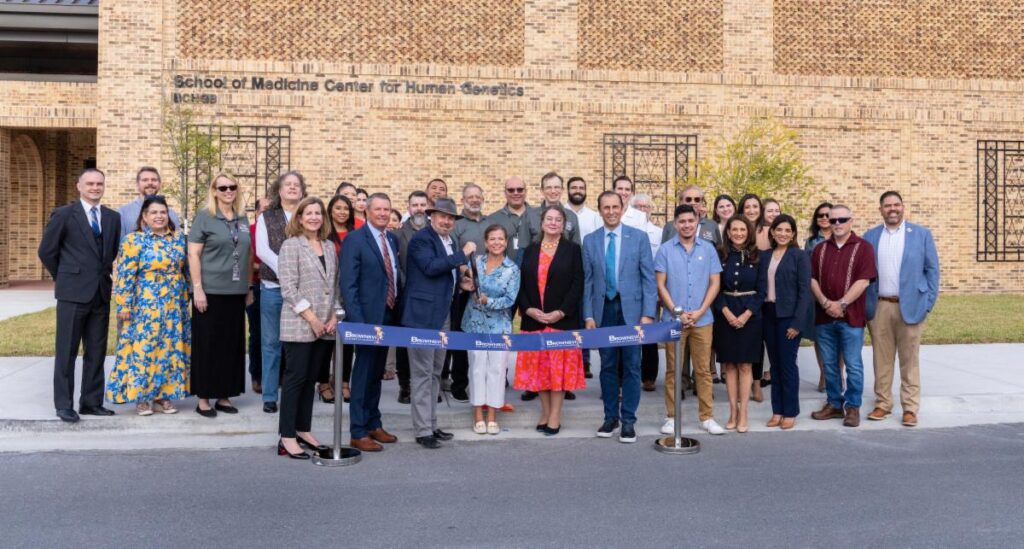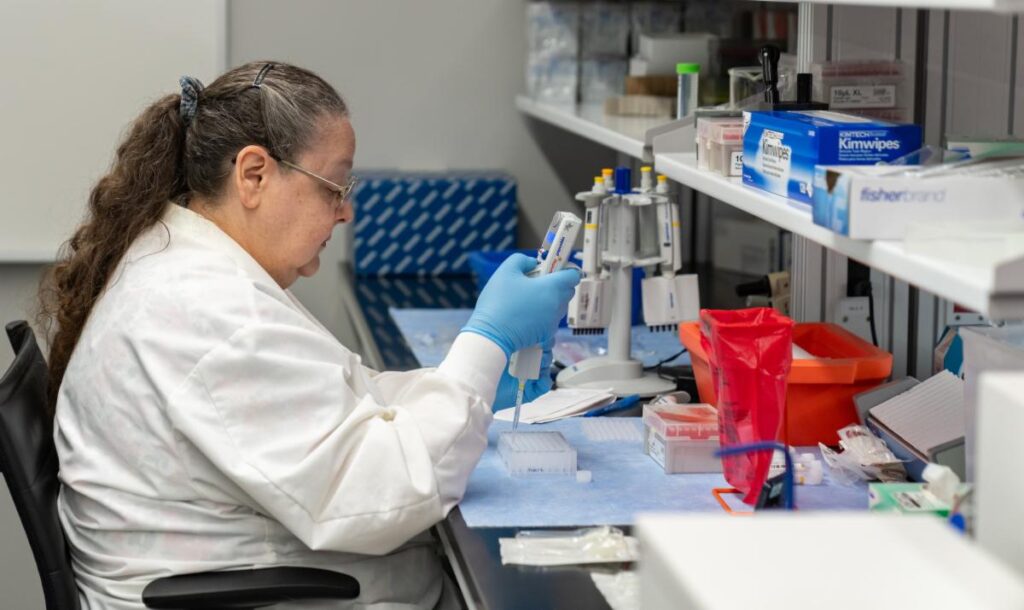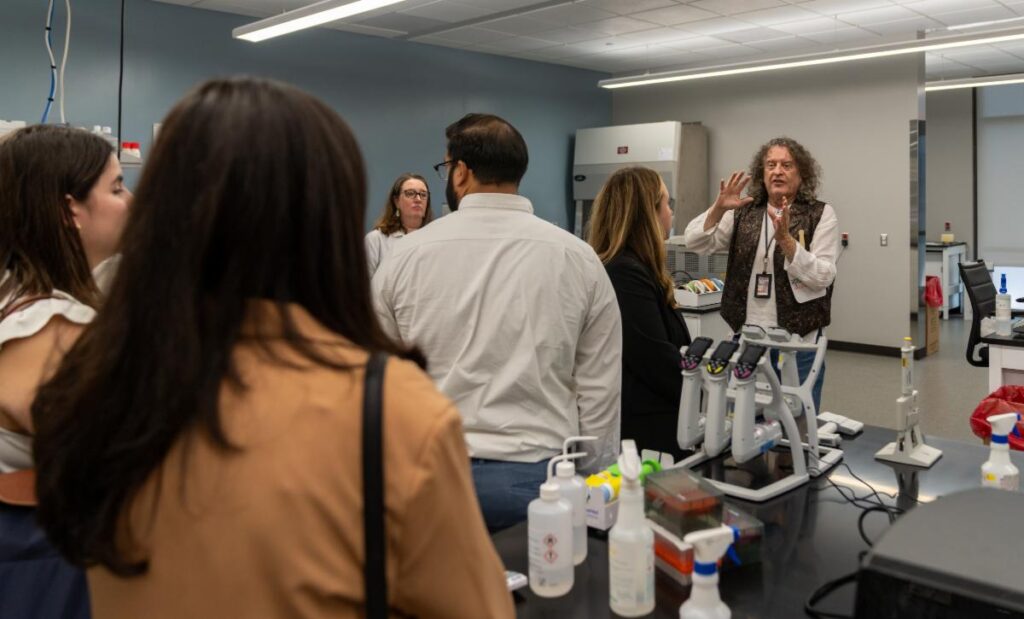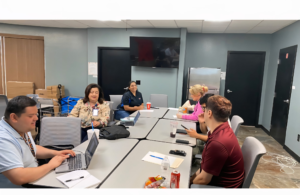- South Texas Students Meet Accordion Music Icons Los Tigres Del Norte In Edinburg Thanks To Khs America/Hohner Alianza Académica Initiative
- Fragile Planet Offers a Nighttime Wildlife Experience
- Falcons Soccer Off & Running
- Cameron County Receives Funds to Improve Two Parks
- Falcons Complete First Half of 32-6A
- School District to Help out Victims of California Wildfires
- Sand Castle Days Continued Despite Unexpected Weather
- Ready for District
- Discussion of Garbage Dumpster Rates, Agreements Between State & City on Highway Regulations, and More
- 31st Annual Shrimp Cook-Off is Right Around the Corner
UTRGV opens its new Center for Human Genetics Building on the Brownsville Campus
- Updated: November 8, 2024
Center will expand and enhance diabetes, obesity and cardiovascular research

By Heriberto Perez-Zuniga
RIO GRANDE VALLEY, TEXAS – OCT. 28, 2024 – The UTRGV School of Medicine today celebrated the opening of its new, state-of-the-art Center for Human Genetics, headquartered on the Brownsville Campus.
The new facility is dedicated to cutting-edge research that addresses major public health concerns in the Rio Grande Valley, including diabetes, obesity, cardiovascular disease, liver cancer, Alzheimer’s disease and depression.
The 17,246-square-foot facility, funded by a Valley Baptist Legacy Foundation grant and support from the UT System Permanent University Fund, will expand research capabilities aimed at delivering life-changing results for the Rio Grande Valley and beyond.
The facility will conduct research studies focused on the Mexican American population in South Texas, a significant leap forward for a region disproportionately affected by those health conditions.
UTRGV President Guy Bailey joined Brownsville Commissioner Bryan Martinez and Dr. Michael Hocker, dean of the UTRGV School of Medicine and senior vice president of UT Health RGV, along with other community leaders, to celebrate the promise the center holds for local families who have struggled with chronic health issues.
“Our researchers have been working to identify the genetic roots of diabetes and obesity for years, and now, with this incredible facility, we can expand that work in ways we only dreamed of before,” Bailey said. “This will directly benefit the people of the Valley, whose health and quality of life have long been impacted by these diseases.”
ADVANCING RESEARCH
Dr. Sarah Williams-Blangero, chief of the UTRGV School of Medicine’s Division of Human Genetics and director of the South Texas Diabetes and Obesity Institute, said the Center for Human Genetics is set to become a hub for groundbreaking research focused on the genetic factors that influence diseases all too prevalent in the Rio Grande Valley.
The facility includes a Magnetic Resonance Imaging (MRI) suite, a genetic sequencing laboratory, as well as office and conference spaces designed to support human genetics research, and will provide researchers with the resources needed to make significant strides in improving health outcomes. And, it will open the door to more complex studies, she said.
“Our work on imaging genomics is critical for understanding diabetes and obesity, but also brain disorders and liver diseases, which are closely tied to metabolic health,” Williams-Blangero said. “Now we can conduct these studies right here in the Valley, instead of relying on facilities elsewhere.”
Researchers will have access to important tools for studies related to psychiatric conditions, including major depressive disorder, which has affected almost 35% of adult Mexican Americans in South Texas.
Williams-Blangero said the center not only advances cutting-edge research, but also ramps up training for the next generation of scientists.
“Our Ph.D. program in human genetics already is training future geneticists right here in the Valley,” she said. “This new facility provides students with state-of-the-art laboratories, giving them the hands-on experience they need to thrive in the field.”

GAME-CHANGER FOR THE VALLEY
In South Texas, where one in three adults suffer from diabetes, The Center for Human Genetics will be a game-changer, Williams-Blangero said.
“This center is here for the people of the Valley. It’s about understanding why these diseases are so prevalent in our community, using that knowledge to find better treatments and, ultimately, to prevent them altogether,” she said.
The data gathered from local residents participating in ongoing studies will help researchers develop personalized treatment strategies, ensuring that the discoveries made in the Valley directly apply to those who need solutions the most.
Since arriving at UTRGV a decade ago to establish the South Texas Diabetes and Obesity Institute, Williams-Blangero and researchers in Human Genetics have secured more than $110 million in funding, leading to the publication of more than 450 scientific papers over those 10 years.
Hocker, dean of the UTRGV medical school, predicts the center’s work will have an impact well beyond the Valley, given its collaborations involving more than 90 institutions around the world.
“We have a world-renowned group of researchers in genetics and diabetes,” he said. “This facility is state-of-the-art, and there’s some incredible research happening in the Rio Grande Valley that’s going to change lives for people in our community.”




